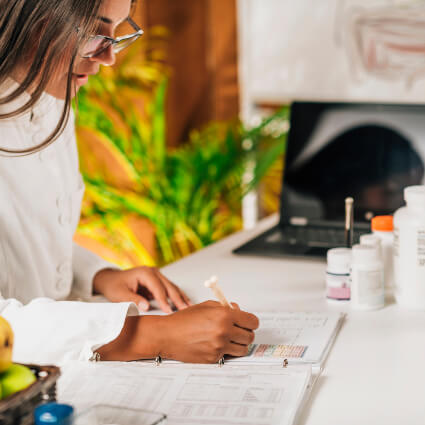
Breast cancer affects one in eight women worldwide, making it one of the most common cancers among women. While genetics play a role, research shows that only about 5-10% of cases are hereditary. The majority are influenced by factors we can address — like hormones, lifestyle, environment, and nutrition.
Understanding Hormones and Breast Cancer Risk
Hormones—especially estrogen—play a central role in breast health. Estrogen isn’t inherently harmful, but how your body metabolizes it can determine whether it’s protective or problematic.
Estrogen is broken down into several metabolites:
- 2-OH estrogen – the protective pathway linked to a lower risk of breast cancer
- 4-OH estrogen – can cause DNA damage and oxidative stress, raising cancer risk
- 16-OH estrogen – promotes cell proliferation and estrogen-sensitive cancer growth
When the balance shifts toward the harmful metabolites (4-OH or 16-OH), the risk of developing breast cancer increases. Understanding your individual hormone metabolism can reveal where support is needed most.
The DUTCH Test: A Deeper Look at Hormone Metabolism
One of the most powerful tools in functional medicine is the DUTCH test — short for Dried Urine Test for Comprehensive Hormones.
This test measures:
- Estrogen and its metabolites
- Progesterone, testosterone, and DHEA
- Cortisol and other stress hormones
Unlike standard hormone blood tests, the DUTCH test shows how your body makes, uses, and clears hormones — giving a complete picture of hormone health and detoxification.
Why It Matters for Breast Cancer Prevention
Poor estrogen metabolism, particularly an imbalance in favor of harmful metabolites, has been linked to increased cell proliferation and DNA mutations.
By identifying these patterns early, functional medicine practitioners can create personalized strategies to optimize hormone balance and reduce long-term cancer risk.
Benefits of Hormone Testing and a Functional Medicine Approach
- Early Detection of Hormonal Imbalances – Catch potential risk factors before symptoms or disease develop.
- Personalized Treatment Plans – Functional medicine focuses on the individual—combining nutrition, lifestyle, and targeted supplementation based on your specific test results.
- Progress Monitoring – Re-testing allows us to see improvements over time and fine-tune your plan for continued balance and protection.
Strategies to Support Breast Health Naturally
- Support Liver Detoxification – Eat foods like leafy greens, garlic, turmeric, and beets to support detox pathways.
- Manage Stress and Cortisol Levels – Incorporate mindfulness, deep breathing, and daily movement to lower stress response.
- Maintain a Healthy Weight – Balanced nutrition and regular exercise support hormone balance.
Protective Foods and Supplements:
- DIM – promotes healthy estrogen metabolism down the protective 2-OH pathway
- Sulforaphane – found in broccoli sprouts; supports estrogen detoxification
- Calcium-D-Glucarate – assists liver detox and estrogen clearance
Reduce Environmental Toxin Exposure
Many environmental chemicals mimic estrogen.
Choose clean personal care products, avoid plastics when possible, and use a water filter.
How Functional Medicine Can Help You
A functional medicine approach looks at the whole picture — not just symptoms.
By assessing hormone balance, gut health, detox pathways, and stress response, we can build a personalized plan to restore balance and reduce risk.
This includes:
- Optimizing nutrition and key nutrients
- Balancing cortisol and stress response
- Reducing toxin exposure
- Supporting liver and gut function
- Monitoring hormones and breast health over time
Watch the Webinar
If you’d like to learn more about how functional medicine can help you take charge of your breast health, watch my 15-minute webinar:
👉 Functional Medicine Approach to Breast Cancer
In it, I share exactly how the DUTCH test works, why estrogen metabolism matters, and practical steps you can take today to support hormone balance and prevention.
